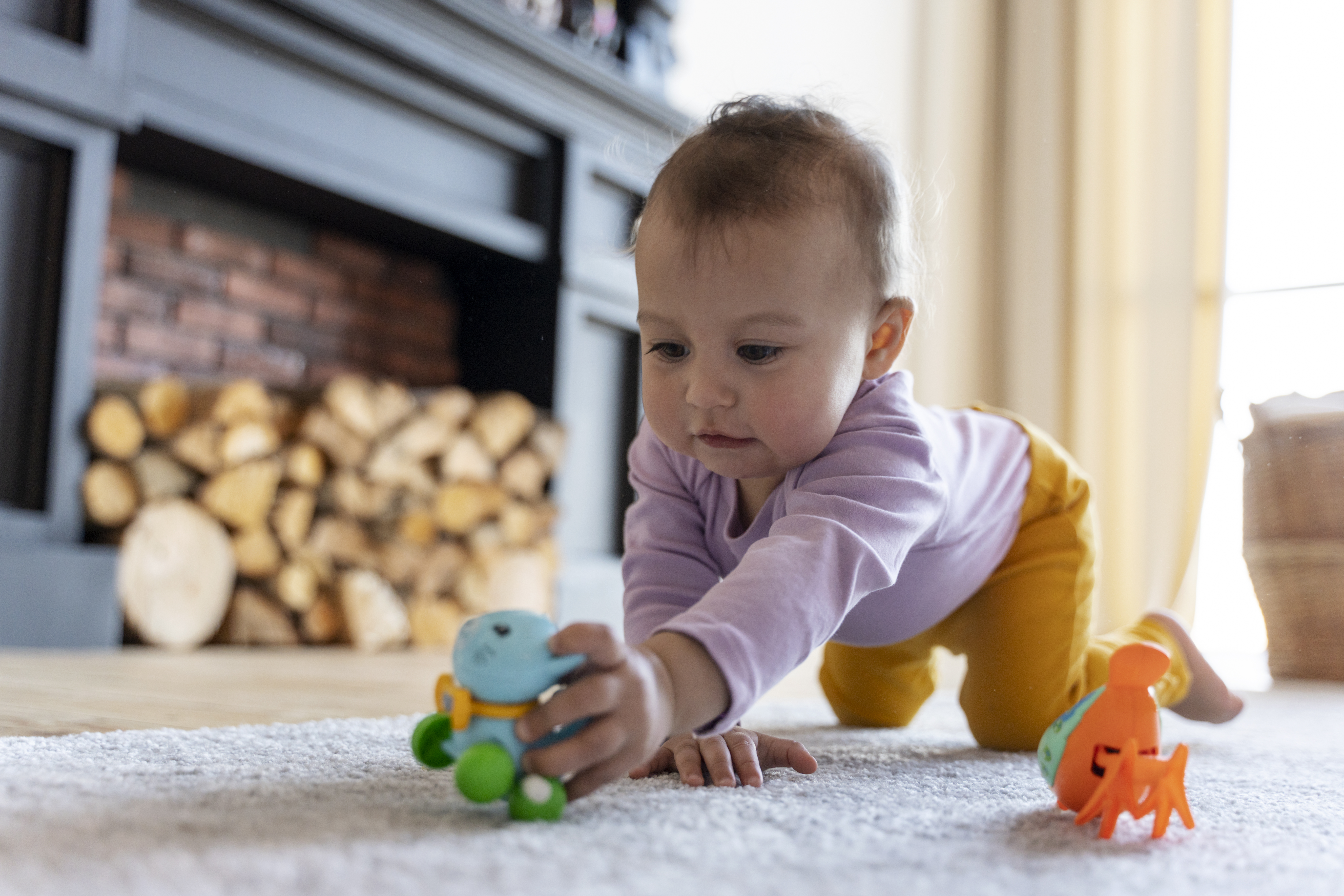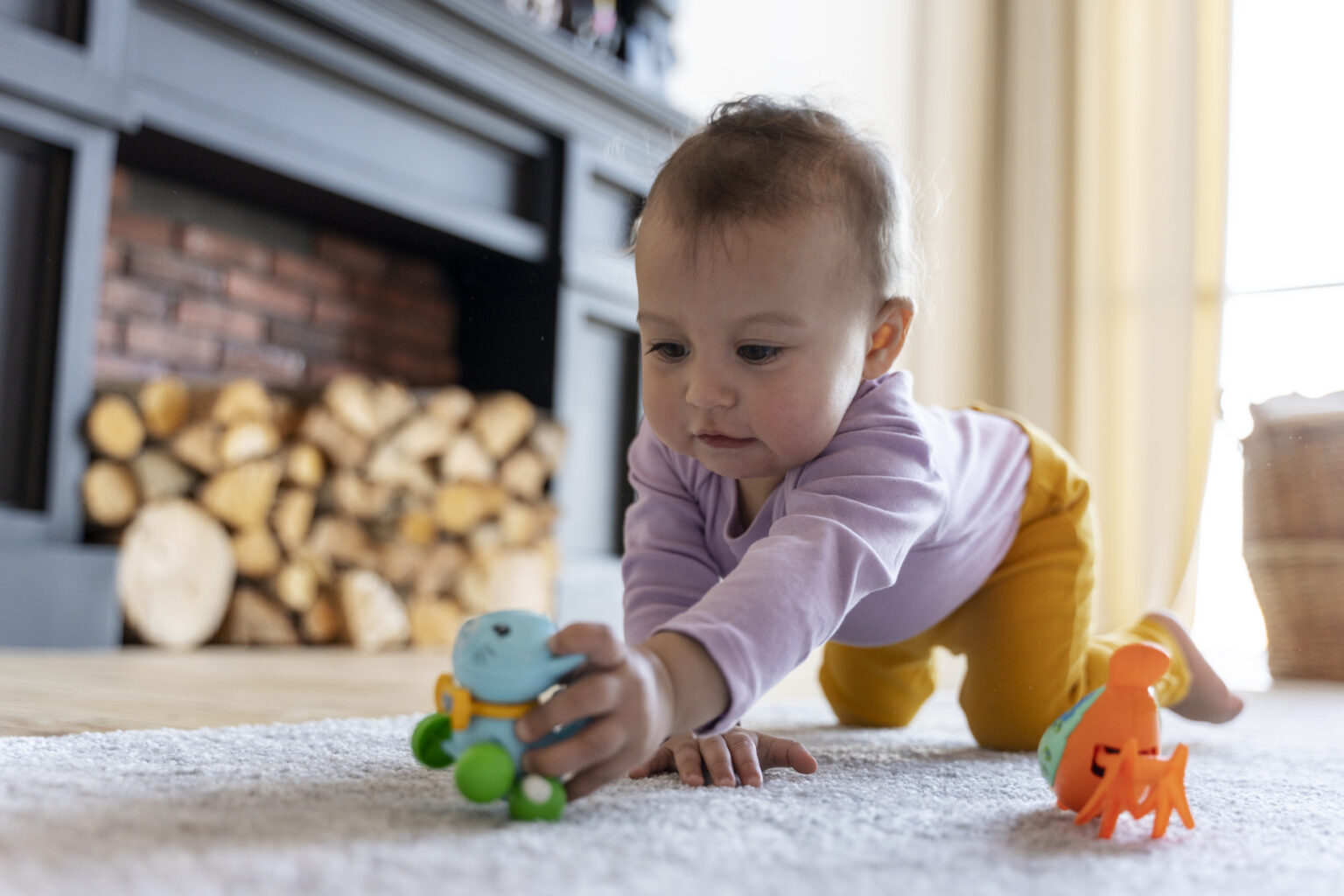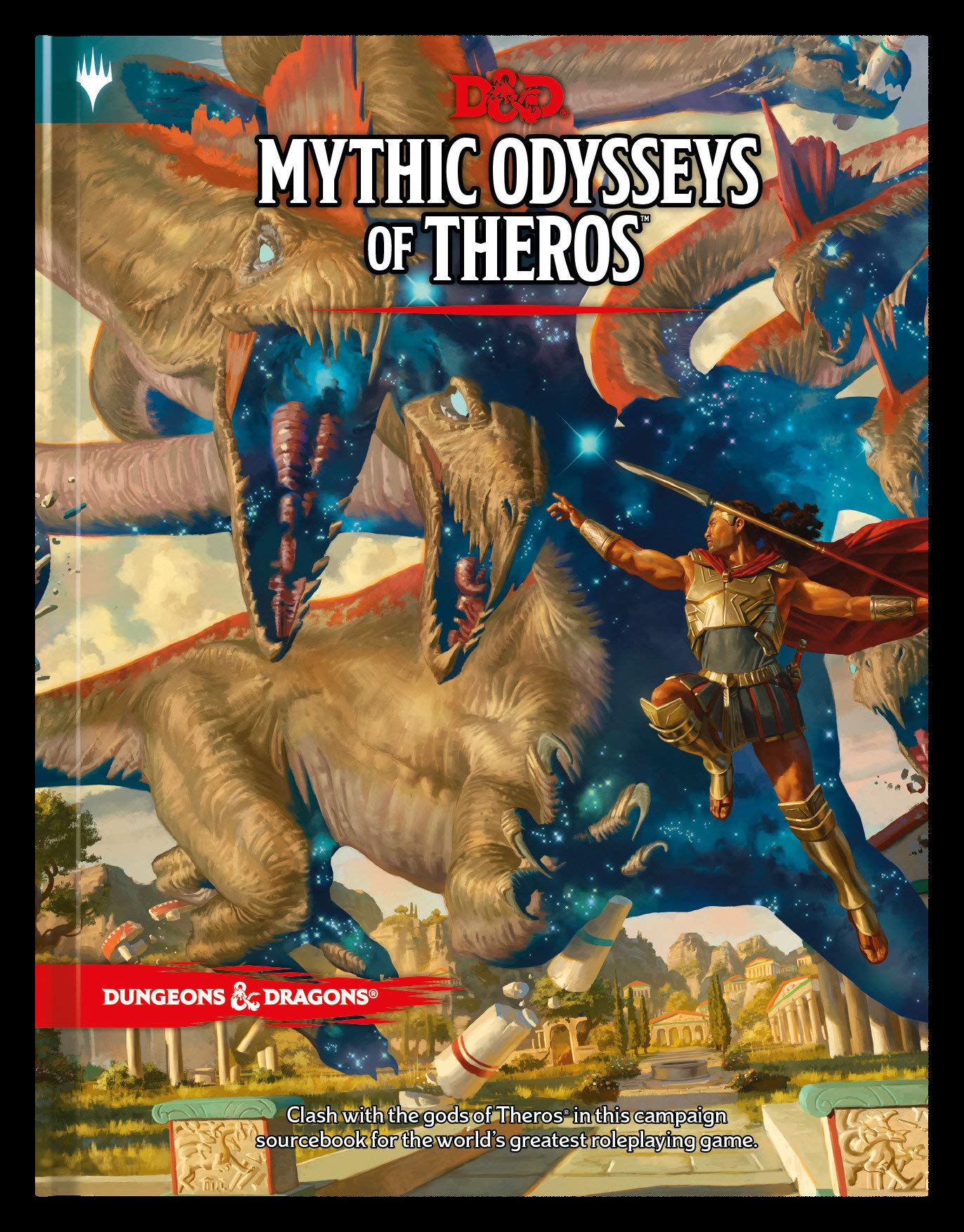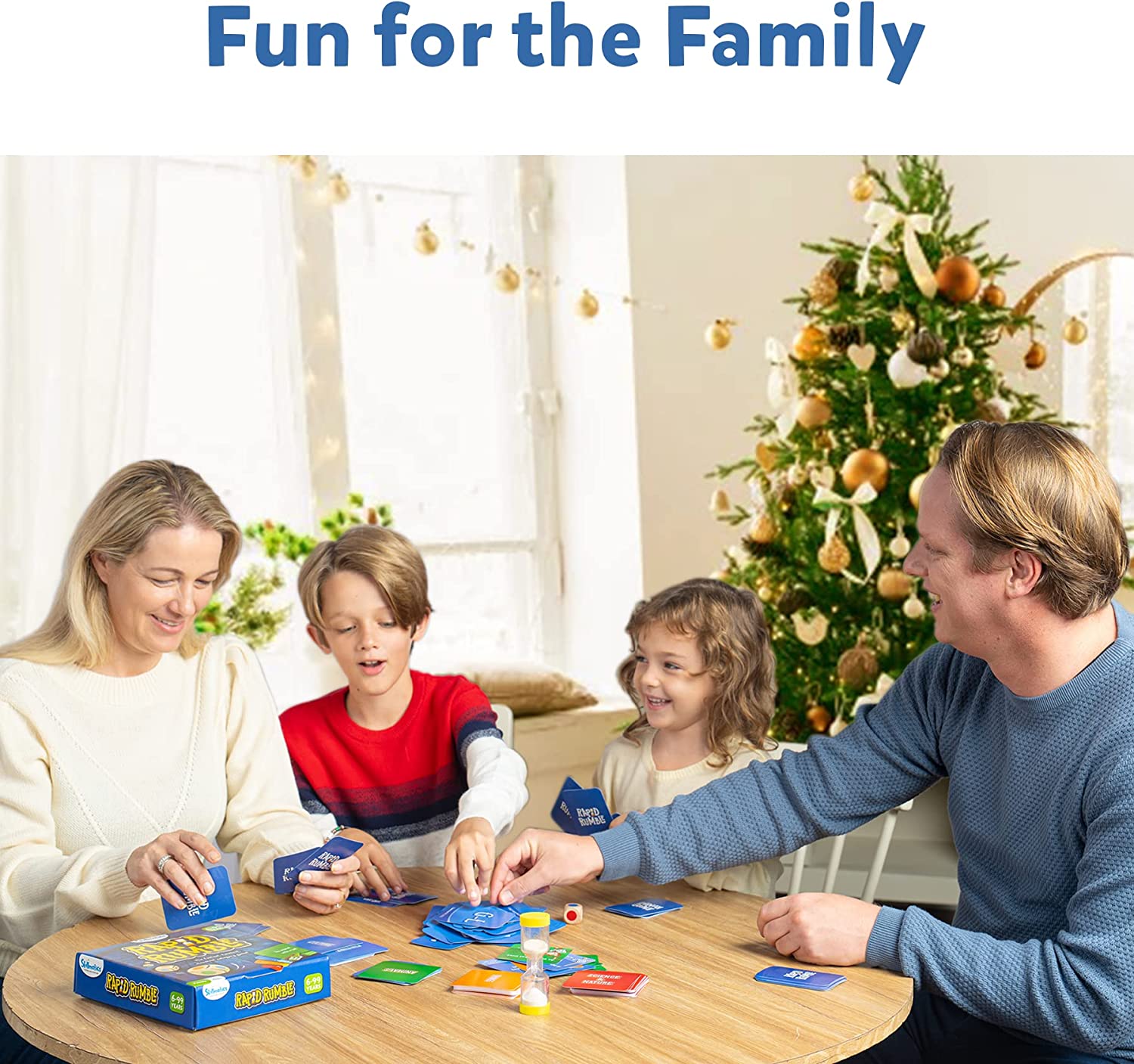We are updating our links. Some links may not be functioning properly. Thank you for your patience!

Smart Starts: Choosing the Right Interactive Toys for Your Baby’s Developmental Journey
Babies are innately curious and eager to learn, and selecting the appropriate toys can significantly influence their developmental journey.
When combined with play, interactive toys provide an exceptional platform for nurturing your baby’s cognitive, physical, and emotional growth. These toys stimulate their young minds and enhance their development, fostering a well-rounded and flourishing foundation.
With countless options available, choosing the right interactive toy for your baby can be overwhelming. Fortunately, with knowledge and understanding of your baby’s developmental milestones, you can make informed decisions that will benefit your child’s growth and well-being.
The Importance of Interactive Toys in Your Baby’s Development
Interactive baby toys facilitate learning through play and encourage exploration, experimentation, imagination, and problem-solving. These activities contribute to your baby’s cognitive, physical, and social-emotional development, promoting skills that will benefit them throughout their lives.
Cognitive Development
Toys that engage your baby’s senses are crucial in promoting cognitive development. Look for interactive toys that captivate their attention with vibrant colours, various textures to explore, and captivating sounds that stimulate their auditory senses.
These multi-sensory experiences provide joy and entertainment and lay the foundation for developing critical thinking and problem-solving skills.
Consider puzzle toys that challenge their cognitive abilities stacking blocks to enhance their motor skills, and shape sorters to foster their understanding of shapes and spatial relationships.
Physical Development
Physical motor skills are crucial for a baby’s development and are often fostered through play. You can actively support and expedite your baby’s physical growth by providing toys that encourage crawling, grasping, and walking.
Consider using play mats to provide a safe and stimulating environment for exploration. Push toys can assist in building strength and coordination, while balls can aid in improving gross motor skills such as throwing and catching.
Additionally, rattles and teething toys provide entertainment and contribute to developing fine motor skills, such as hand-eye coordination and finger dexterity.
Emotional Development
Interactive toys are crucial and fascinating in promoting your baby’s emotional development. For instance, dolls and stuffed animals serve as companions that can spark empathy and nurture their caring nature as they engage in imaginative play and create their little world of stories and adventures.
Also, toys that respond to your baby’s actions, such as making a delightful sound when squeezed, entertain and help them understand cause-and-effect relationships, fostering cognitive development and problem-solving skills.
As your baby interacts with these toys and discovers the outcomes of their actions, their confidence grows, empowering them to further explore and learn through play, creating a rich and fulfilling experience for their overall development.
A Spotlight on Interactive Toys Designed in Greece
Greece, a country renowned for its rich history and cultural heritage, also holds a significant position in the toy industry.
Greek children in ancient times had toys that bore a resemblance to those enjoyed by children today. Among their playthings were rattles, tops, and pull toys. Interestingly, it is possible that the yo-yo, or something akin to it, originated in Greece. This toy consisted of two terra cotta discs.
Today, toy designers from Greece are known for their expertise in creating interactive toys that entertain and cater to children’s developmental needs worldwide. Through their commitment to quality, sustainability, and child-centric design, Greek-designed toys provide a comprehensive and enriching play experience while promoting a balanced and holistic approach to child development.
These meticulously crafted toys enhance fine motor skills, cognitive abilities, and social-emotional skills, ensuring a well-rounded and comprehensive approach to child development.
Moreover, Greek-designed learning toys also offer environmentally friendly options that promote sustainability and stimulate language development and creativity. With a focus on using eco-friendly materials, these toys provide educational value and instil a sense of environmental consciousness in young minds.
Combining quality craftsmanship, attention to detail, and a commitment to holistic child development makes Greek-designed toys stand out in the global market.
Factors to Consider When Choosing Interactive Toys
When selecting interactive toys for your baby, several factors must be considered to ensure they are developmentally appropriate and safe for your child. These factors include:
- Age Appropriateness: Each toy is designed with a specific age range, considering children’s developmental milestones. Choosing toys that align with your baby’s current abilities and interests is crucial.
- Safety: An important consideration while choosing toys for your infant is their safety. Make sure there are no little parts that could cause a danger of choking. The toys are non-toxic and sturdy.
- Variety: It is essential to provide your baby with various interactive toys to stimulate their senses and keep them engaged. This can include toys that encourage hand-eye coordination, motor skills, language development, creativity, and imagination.
- Open-ended Play: Look for toys that allow your baby to use their creativity and imagination rather than those with a fixed outcome. This type of play promotes problem-solving skills and encourages independence.
Examples of Interactive Toys for Different Developmental Stages
Here are some examples of interactive toys that are suitable for different developmental stages:
- 0-6 months: For infants aged 0-6 months, it’s beneficial to provide them with rattles to stimulate their auditory senses, soft books to introduce them to different textures, play mats with sensory elements to encourage exploration, and high-contrast toys to enhance their visual development.
- 6-12 months: As babies transition into the 6-12 month age range, consider offering stacking rings to promote hand-eye coordination and shape sorters to enhance their problem-solving skills. Soft blocks to encourage tactile exploration, push and pull toys to support their physical development, and musical instruments to expose them to different sounds and rhythms.
- 1-2 years: Toddlers aged 1-2 can benefit from engaging with puzzles to enhance their cognitive abilities, nesting cups to foster their fine motor skills, and toy cars and trucks to encourage imaginative play. Get dress-up costumes to stimulate their creativity and building blocks to promote their spatial awareness and hand-eye coordination.
- 2-3 years: For children between the ages of 2 and 3, consider providing them with pretend play sets to encourage imaginative thinking, larger building blocks to support their construction skills, and simple board games to introduce basic rules and social interaction. You can also playdough to enhance their sensory exploration and finger puppets to inspire storytelling and language development.
Remember, these are just examples. Each child develops at their own pace. Observing your baby’s interests and abilities is essential to determine which toys would be most beneficial for them.
Safety First
Remember, safety is paramount when choosing toys for your baby. Always check for small parts, sharp edges, and toxic materials. Also, ensure toys are age-appropriate and align with your baby’s developmental stage.
The right interactive toys can make your baby’s developmental journey a fun-filled exploration of the world around them. Make smart choices, and watch your little one grow and learn daily. Take your time and carefully select toys that will entertain and support your baby’s growth and development.
In addition to interactive toys, be sure to provide a variety of learning opportunities for your baby. This can include reading books, going on walks in nature, and exploring different textures and materials. The more experiences your baby has, the more their brain will develop and grow.
Lastly, don’t underestimate the power of free play. Give your baby unstructured time to explore their environment and engage with simple objects like boxes, pots, and pans. This type of play allows for creativity and imagination to flourish, which are essential skills for future learning.
Conclusion
Selecting the perfect interactive toys is vital for your baby’s holistic development. Remember to consider their cognitive, physical, and emotional needs, prioritise safety, and don’t miss the fun!
By providing the right toys and ample playtime, you’ll support your baby in reaching significant developmental milestones and laying the foundation for a lifetime of learning. Thus, let loose and enjoy playful moments with your little one! Happy parenting and happy playing!
Babies are innately curious and eager to learn, and selecting the appropriate toys can significantly influence their developmental journey.
When combined with play, interactive toys provide an exceptional platform for nurturing your baby’s cognitive, physical, and emotional growth. These toys stimulate their young minds and enhance their development, fostering a well-rounded and flourishing foundation.
With countless options available, choosing the right interactive toy for your baby can be overwhelming. Fortunately, with knowledge and understanding of your baby’s developmental milestones, you can make informed decisions that will benefit your child’s growth and well-being.
The Importance of Interactive Toys in Your Baby’s Development
Interactive baby toys facilitate learning through play and encourage exploration, experimentation, imagination, and problem-solving. These activities contribute to your baby’s cognitive, physical, and social-emotional development, promoting skills that will benefit them throughout their lives.
Cognitive Development
Toys that engage your baby’s senses are crucial in promoting cognitive development. Look for interactive toys that captivate their attention with vibrant colours, various textures to explore, and captivating sounds that stimulate their auditory senses.
These multi-sensory experiences provide joy and entertainment and lay the foundation for developing critical thinking and problem-solving skills.
Consider puzzle toys that challenge their cognitive abilities stacking blocks to enhance their motor skills, and shape sorters to foster their understanding of shapes and spatial relationships.
Physical Development
Physical motor skills are crucial for a baby’s development and are often fostered through play. You can actively support and expedite your baby’s physical growth by providing toys that encourage crawling, grasping, and walking.
Consider using play mats to provide a safe and stimulating environment for exploration. Push toys can assist in building strength and coordination, while balls can aid in improving gross motor skills such as throwing and catching.
Additionally, rattles and teething toys provide entertainment and contribute to developing fine motor skills, such as hand-eye coordination and finger dexterity.
Emotional Development
Interactive toys are crucial and fascinating in promoting your baby’s emotional development. For instance, dolls and stuffed animals serve as companions that can spark empathy and nurture their caring nature as they engage in imaginative play and create their little world of stories and adventures.
Also, toys that respond to your baby’s actions, such as making a delightful sound when squeezed, entertain and help them understand cause-and-effect relationships, fostering cognitive development and problem-solving skills.
As your baby interacts with these toys and discovers the outcomes of their actions, their confidence grows, empowering them to further explore and learn through play, creating a rich and fulfilling experience for their overall development.
A Spotlight on Interactive Toys Designed in Greece
Greece, a country renowned for its rich history and cultural heritage, also holds a significant position in the toy industry.
Greek children in ancient times had toys that bore a resemblance to those enjoyed by children today. Among their playthings were rattles, tops, and pull toys. Interestingly, it is possible that the yo-yo, or something akin to it, originated in Greece. This toy consisted of two terra cotta discs.
Today, toy designers from Greece are known for their expertise in creating interactive toys that entertain and cater to children’s developmental needs worldwide. Through their commitment to quality, sustainability, and child-centric design, Greek-designed toys provide a comprehensive and enriching play experience while promoting a balanced and holistic approach to child development.
These meticulously crafted toys enhance fine motor skills, cognitive abilities, and social-emotional skills, ensuring a well-rounded and comprehensive approach to child development.
Moreover, Greek-designed learning toys also offer environmentally friendly options that promote sustainability and stimulate language development and creativity. With a focus on using eco-friendly materials, these toys provide educational value and instill a sense of environmental consciousness in young minds.
Combining quality craftsmanship, attention to detail, and a commitment to holistic child development makes Greek-designed toys stand out in the global market.
Factors to Consider When Choosing Interactive Toys
When selecting interactive toys for your baby, several factors must be considered to ensure they are developmentally appropriate and safe for your child. These factors include:
- Age Appropriateness: Each toy is designed with a specific age range, considering children’s developmental milestones. Choosing toys that align with your baby’s current abilities and interests is crucial.
- Safety: An important consideration while choosing toys for your infant is their safety. Make sure there are no little parts that could cause a danger of choking. The toys are non-toxic and sturdy.
- Variety: It is essential to provide your baby with various interactive toys to stimulate their senses and keep them engaged. This can include toys that encourage hand-eye coordination, motor skills, language development, creativity, and imagination.
- Open-ended Play: Look for toys that allow your baby to use their creativity and imagination rather than those with a fixed outcome. This type of play promotes problem-solving skills and encourages independence.
Examples of Interactive Toys for Different Developmental Stages
Here are some examples of interactive toys that are suitable for different developmental stages:
- 0-6 months: For infants aged 0-6 months, it’s beneficial to provide them with rattles to stimulate their auditory senses, soft books to introduce them to different textures, play mats with sensory elements to encourage exploration, and high-contrast toys to enhance their visual development.
- 6-12 months: As babies transition into the 6-12 month age range, consider offering stacking rings to promote hand-eye coordination and shape sorters to enhance their problem-solving skills. Soft blocks to encourage tactile exploration, push and pull toys to support their physical development, and musical instruments to expose them to different sounds and rhythms.
- 1-2 years: Toddlers aged 1-2 can benefit from engaging with puzzles to enhance their cognitive abilities, nesting cups to foster their fine motor skills, and toy cars and trucks to encourage imaginative play. Get dress-up costumes to stimulate their creativity and building blocks to promote their spatial awareness and hand-eye coordination.
- 2-3 years: For children between the ages of 2 and 3, consider providing them with pretend play sets to encourage imaginative thinking, larger building blocks to support their construction skills, and simple board games to introduce basic rules and social interaction. You can also playdough to enhance their sensory exploration and finger puppets to inspire storytelling and language development.
Remember, these are just examples. Each child develops at their own pace. Observing your baby’s interests and abilities is essential to determine which toys would be most beneficial for them.
Safety First
Remember, safety is paramount when choosing toys for your baby. Always check for small parts, sharp edges, and toxic materials. Also, ensure toys are age-appropriate and align with your baby’s developmental stage.
The right interactive toys can make your baby’s developmental journey a fun-filled exploration of the world around them. Make smart choices, and watch your little one grow and learn daily. Take your time and carefully select toys that will entertain and support your baby’s growth and development.
In addition to interactive toys, be sure to provide a variety of learning opportunities for your baby. This can include reading books, going on walks in nature, and exploring different textures and materials. The more experiences your baby has, the more their brain will develop and grow.
Lastly, don’t underestimate the power of free play. Give your baby unstructured time to explore their environment and engage with simple objects like boxes, pots, and pans. This type of play allows for creativity and imagination to flourish, which are essential skills for future learning.
Conclusion
Selecting the perfect interactive toys is vital for your baby’s holistic development. Remember to consider their cognitive, physical, and emotional needs, prioritize safety, and don’t miss the fun!
By providing the right toys and ample playtime, you’ll support your baby in reaching significant developmental milestones and laying the foundation for a lifetime of learning. Thus, let loose and enjoy playful moments with your little one! Happy parenting and happy playing!









